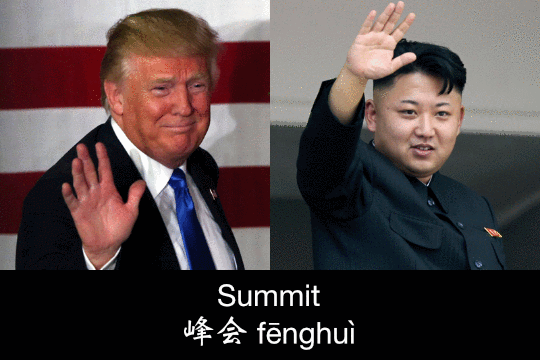‘Like it or not, Donald Trump’s policy has been remarkably successful’


Xinhua News Agency reports: “Chinese President Xi Jinping and his U.S. counterpart, Donald Trump, on Friday discussed the situation on the Korean Peninsula and bilateral relations via phone.” According to the article, Trump said that Xi was proven right “to insist on a dialogue between the United States and the DPRK,” or the Democratic People’s Republic of Korea, as the North likes to be known. The call came after Trump accepted an invitation to meet North Korean leader Kim Jong-un.
What to make of the proposed meeting between two leaders? Let’s turn to Andrei Lankov, a Russian scholar of Korean studies who was first sent to Pyongyang in 1985 by the Soviet Union. He is one of the most perspicacious observers of North Korea. We recommended his book The Real North Korea: Life and Politics in the Failed Stalinist Utopia last year in our summer reading list.
On NK News, he notes (paywall) Pyongyang’s first mention of eventual denuclearization since 2006, and argues that the possibility of a North Korea-U.S. summit, “despite its limitations, is a welcome development.”
- Why is all this happening? “The answer is simple,” says Lankov: “Like it or not, Donald Trump’s policy has been remarkably successful — so far, at least.”
- Trump’s bellicose rhetoric, “a slow-motion increase in the American military presence in and around the Korean Peninsula,” and the attrition of “many U.S. officials with reputations as soft liners” are all factors.
- It is China’s fear of U.S. military action on the Korean Peninsula that convinced Beijing to properly implement harsh sanctions on Pyongyang, according to Lankov. The sanctions, he says, are “unprecedented…quite close to an embargo on trade with North Korea.” The sanctions are biting.
- In South Korea, Lankov says the “Moon administration has been positively terrified by the news from Washington,” which has motivated Seoul to put energy into seeking talks.
- “The North Koreans are likely going to make serious concessions,” says Lankov, possibly a moratorium on nuclear tests and missile launches, but “having learned the lessons of Libya, Iraq, and Ukraine,” the North Korea leaders will not give up their nuclear weapons, despite lip service to denuclearization.
Lankov concludes that whatever agreement may be reached at a Kim-Trump summit, it will be imperfect, but that “even such an imperfect agreement is significantly better than any realistic alternative — above all, a full-scale war.”
I could not agree more.
Two delegates out of 2,964 vote against removing term limits for Xi
You know the news already, no doubt. But if you’ve been in a cave over the last 24 hours, the BBC reports: “China has approved the removal of the two-term limit on the presidency, effectively allowing Xi Jinping to remain in power for life.”
- The constitutional changes were passed on Sunday by the National People’s Congress. The BBC says that “two delegates voted against the change and three abstained, out of 2,964 votes.”
- Hong Kong commentator Lee Yee 李怡 (李秉尧) has written a few caustic commentaries on the constitutional changes, which you can read in a translation by Geremie Barmé on China Heritage.
A letter from Robert Lawrence Kuhn
In last Friday’s Access newsletter — In favor of lifetime rule for Xi — I commented on an article by Robert Lawrence Kuhn that presented an argument in favor of China’s removal of presidential term limits. He was kind enough to respond with two corrections, and some comments on his work.
I apologize for the errors: The egregious one is that I said Kuhn had not interviewed Jiang Zemin. In fact, he spent more than three hours talking to him.
With Robert’s permission, I have reproduced his letter in full on our Access member site. (Click here to join Access; members, please email lucas@thechinaproject.com, or chat with us on Slack if you have problems accessing the page.)






